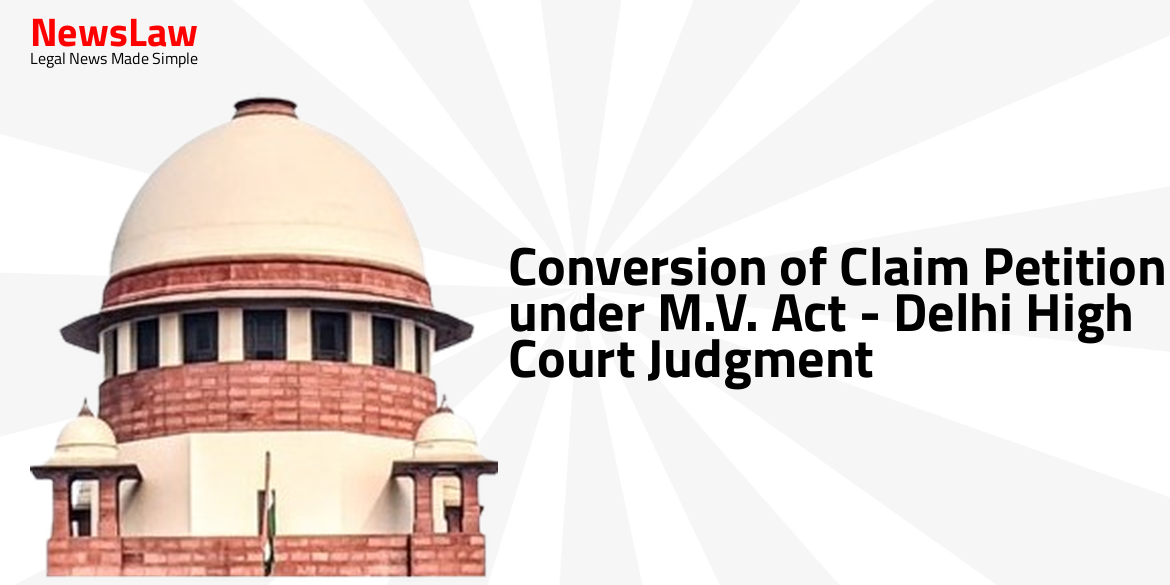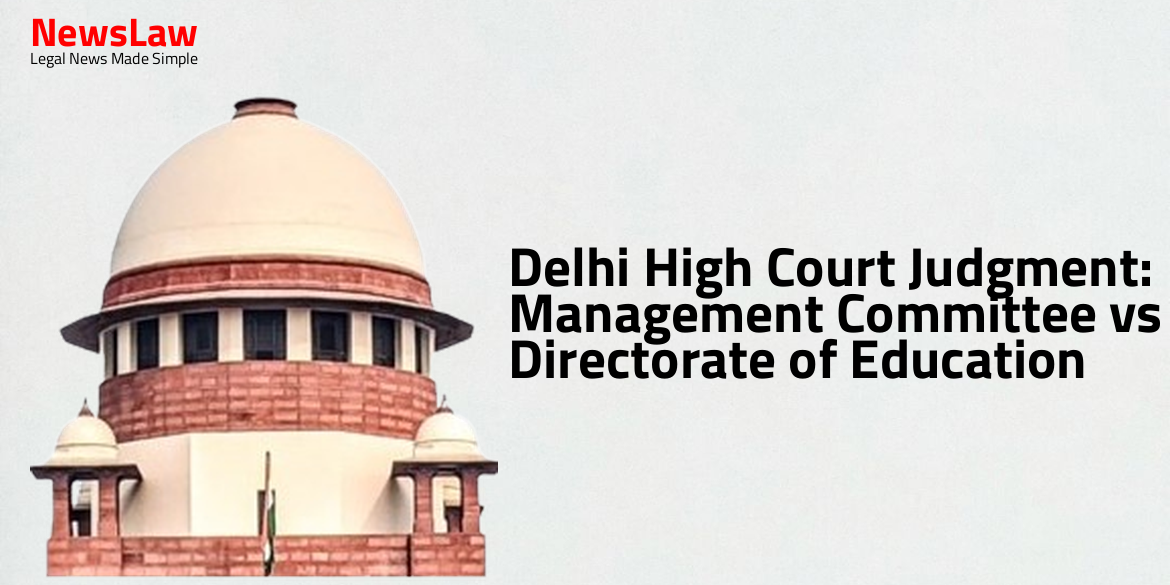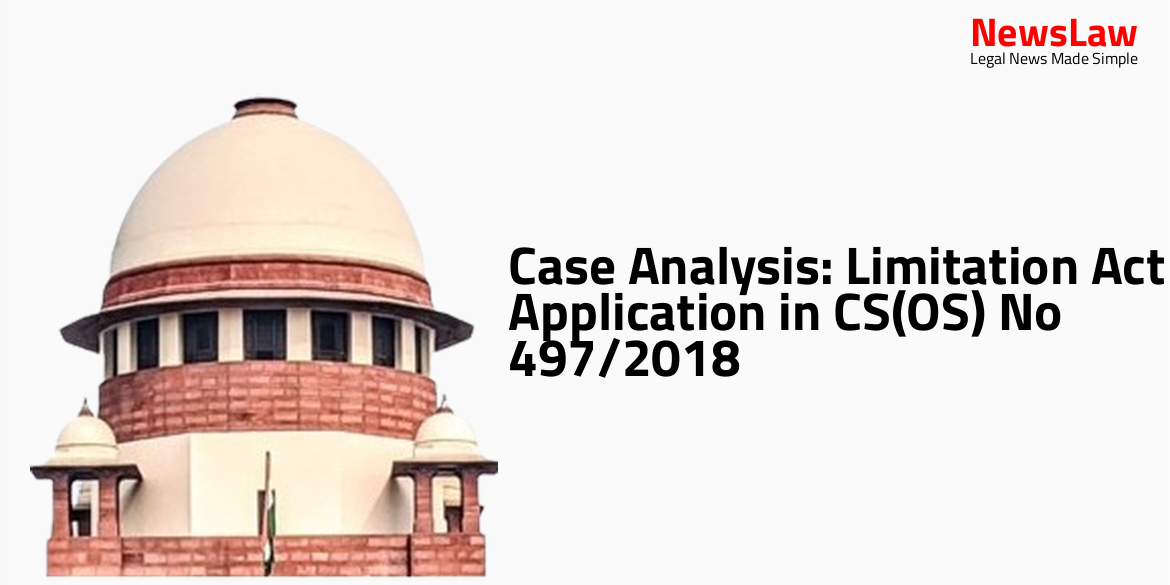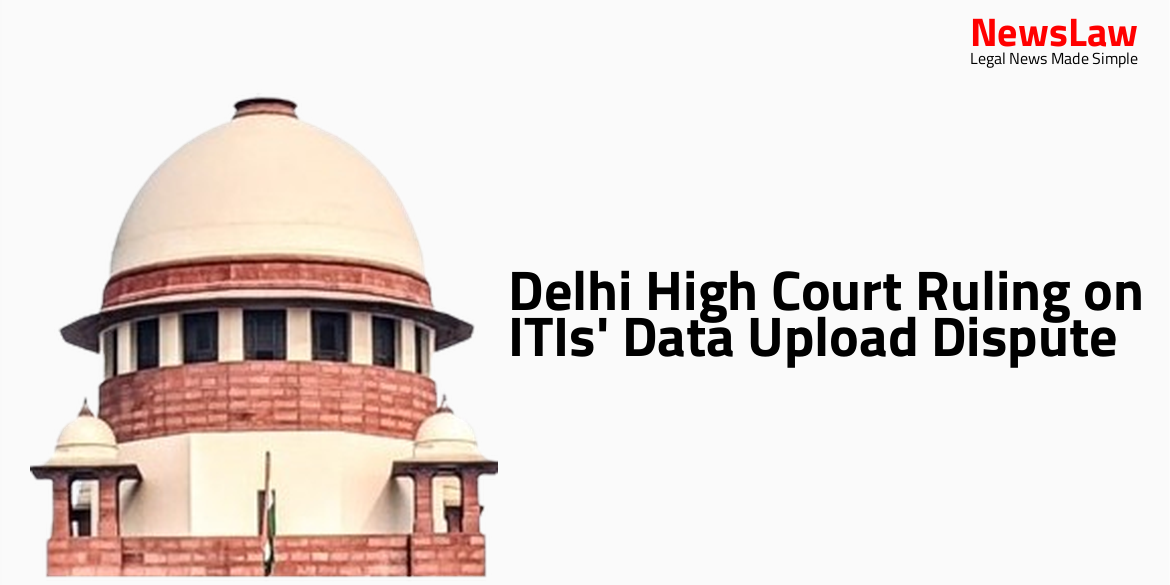A recent judgment by the Delhi High Court sheds light on the conversion of a claim petition under the Motor Vehicles Act. The case involves the parents of the deceased student as claimants seeking compensation. The Court addressed discrepancies in witness testimonies and analyzed evidence to determine the outcome of the case. Stay tuned for key insights into legal proceedings and compensation awards.
Facts
- The claim petition was converted to one under Section 163-A of the M.V. Act.
- Statutory compensation of Rs. 5 lakhs was awarded to the claimants-parents.
- Additional compensation was awarded for loss of consortium, funeral expenses, and loss of estate.
- Claim petition under Section 166 of the M.V. Act was dismissed.
- Total compensation of Rs. 6,10,000/- was awarded to the claimants-parents with interest @ 6% per annum.
- PW-2 Wasim was also examined by the police in FIR no. 435/15 PS Burari related to the accident where the deceased lost his life.
- PW-2 stated that he was driving his Auto-Rickshaw on the day of the accident and witnessed the Haryana Roadways Bus speeding up before Burari Red Light, causing the deceased to fall and be run over by the rear wheels of the bus.
- The statement of PW-2 suggests that the deceased was alighting from the front gate of the bus when the driver suddenly accelerated the bus, leading to the fatal accident.
- The claimants, parents of the deceased, filed a compensation claim under M.V. Act alleging that the driver of the offending bus negligently sped up, causing their son’s death.
- FIR No. 435/2015 was registered under Sections 279/338 of the IPC at Police Station Burari due to the incident.
- PW-2 affirmed through his affidavit that the driver of the offending bus acted rashly and negligently, resulting in the tragic event.
- During cross-examination, PW-2 was questioned by the first and third respondents.
Arguments
- Argument raised by the petitioner’s counsel regarding the credibility of the testimony provided by PW-2/Wasim.
- Contradiction pointed out in the version of the incident provided by the driver and conductor of the bus.
- Assertion made by the petitioner’s counsel that the liability for compensation was on the insurance company.
- Challenge made by the petitioner’s counsel regarding the tribunal’s authority to convert the claim petition under Section 166 into one under Section 163-A without an application from the claimants.
- Reference to the case of Deepal Girishbhai Soni v. United India Insurance Co. Ltd. in support of the argument against conversion of claim petition.
- Objection made by the petitioner’s counsel regarding the quantum of compensation awarded not being in accordance with the law.
- Counter-argument presented by the respondent’s counsel stating that the tribunal had the power to convert the claim petition suo moto based on a court decision.
- Citing the case of United India Insurance Company Ltd. v. Rita Devi and Raj Narain Jha v. Jagdish in support of the tribunal’s authority to convert the claim petition.
- The claimant in the case of Deepal Girishbhai Soni preferred two simultaneous claim petitions under different sections of the M.V. Act.
- The core issue before the Supreme Court was whether two separate petitions could be instituted by the claimant.
- The appellant, the Insurance Company, challenged the conversion of the claim petition to Section 163-A of the M.V. Act.
- The challenge raised by the Insurance Company was found to be not sustainable in law.
- The testimony of PW-2/Wasim was questioned by the Insurance Company’s counsel, alleging embellishments and flaws.
Analysis
- Admissions by witnesses establish that the deceased alighted from the moving vehicle without requesting the driver or conductor to stop.
- It was testified that the offending vehicle was moving at a slow speed when the deceased alighted.
- The court found it appropriate to hold that the petitioners failed to prove negligence on the part of the driver in causing the accident.
- Witnesses stated that the deceased jumped out without asking the driver or conductor to stop the bus.
- The witnesses’ testimony was consistent and did not reveal any contradictions.
- The court highlighted the risk of alighting from a moving vehicle and the importance of safety precautions.
- The court discussed the conversion of claim petitions under different sections of the Motor Vehicles Act.
- Several legal precedents were referenced to support the conversion of claim petitions.
- The court emphasized the intent of the legislation to provide speedy compensation to accident victims.
- Witness testimony and cross-examination played a crucial role in determining the course of the case.
- The court discussed the limitations on pursuing compensation under different sections of the Motor Vehicles Act.
- The court addressed objections raised by the insurance company regarding the compensation amount.
- The court examined the evidence regarding the motion of the offending vehicle at the time of the accident.
- The court considered the powers of the Claims Tribunal and the rules governing such proceedings.
- Amendment of claim petitions for enhanced compensation was discussed in the context of justice.
- The case involved the parents of a deceased student seeking compensation for a fatal accident.
- The court analyzed the discrepancies in witness testimonies and the significance of evidence.
- Based on the evidence and arguments presented, the court found no grounds for enhancing the compensation amount.
- The court concluded that the accident was a result of the deceased’s choice to alight from the bus in a negligent manner.
- Section 163-A of the Motor Vehicles Act has been repealed by the Motor Vehicles (Amendment) Act, 2019.
- Section 164 has been introduced in place of Section 163-A.
- Section 164 states that the owner of the motor vehicle or the authorized insurer is liable to pay compensation in case of death or grievous hurt due to an accident arising out of the use of the motor vehicle.
- The compensation amounts are five lakh rupees in case of death and two and a half lakh rupees in case of grievous hurt.
- The claimant is not required to prove that the death or grievous hurt was due to any wrongful act or neglect.
- If compensation has already been paid under another law for the same incident, it will be deducted from the compensation payable under Section 164.
- The special provision in this case only allows compensation up to Rs. Five Lacs without proof of negligence.
- The compensation awarded for loss of consortium, loss of estate, and funeral expenses exceeds this limit.
- Therefore, these awards are not sustainable in law and fall outside the scope of the provision.
Decision
- The appeal filed by the claimants’ parents is dismissed.
- The appeal filed by the appellant/insurance company is partly allowed, with a total compensation amount of Rs. Five Lacs payable to the claimants’ parents.
- Interest at a rate of 7.5% from the date of filing of the DAR till realization is to be paid.
- The total compensation amount of Rs. Five Lacs is to be paid with interest, and the appellant/insurance company shall forfeit the statutory deposit of Rs. 25,000 to the State.
- Rs. Two Lacs have already been disbursed to the claimants’ parents by the appellant/insurance company.
- Interest on the total compensation amount will be calculated till the date of payment of Rs. Two Lacs, and thereafter on the remaining Rs. Three Lacs.
- The total amount of compensation in case of death is Rs. Five Lacs.
Case Title: SHIV PRASAD INDRAMANI & ANR. Vs. MUBIN AHMED & ORS. (2024:DHC:4303)
Case Number: MAC.APP.-225/2021



